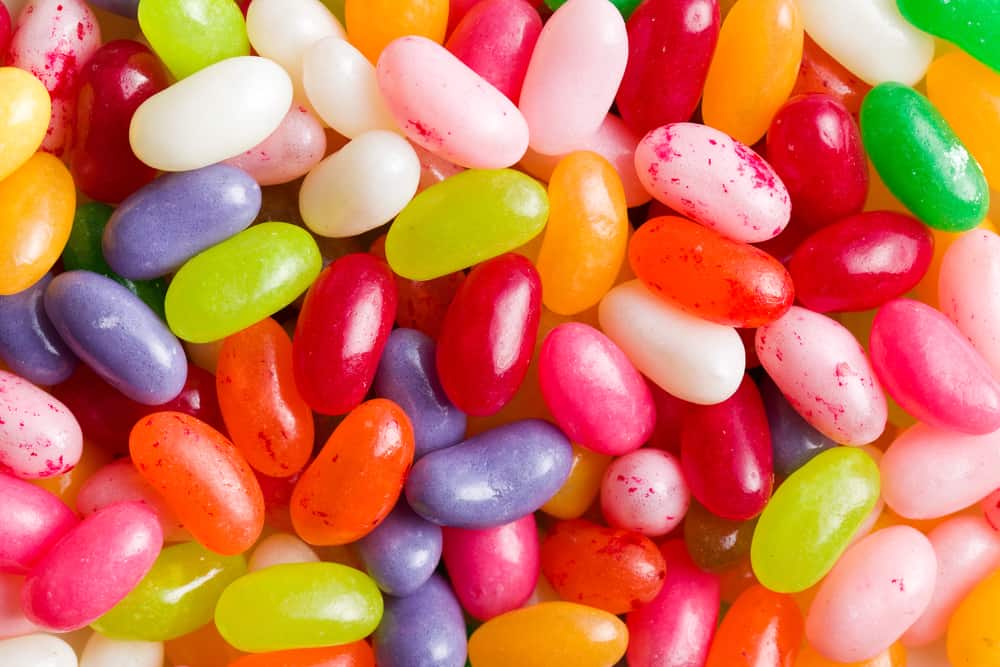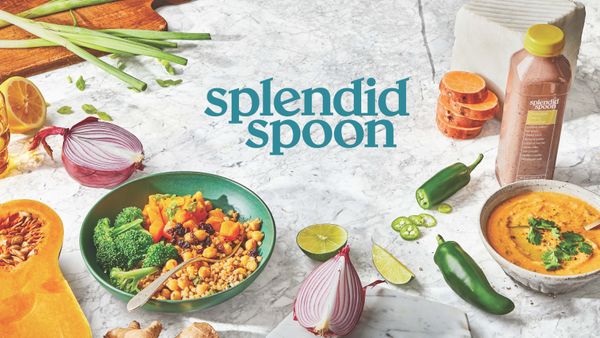As with most chewy candies, a plant-based diet will always be on the lookout for gelatin. This begs the question, are jelly beans vegan? The answer is that the most popular brand making them “Gourmet Jelly Beans” is not.
This isn’t always the case, so we are going to take a look at why, the common culprits, and seek out brands that a vegan can enjoy.
For a vegan, it is good to take a look at two of the most popular brands, Jelly Belly, and Gourmet Jelly Beans as these are widely available.
Jelly Belly Ingredients
The ingredient profile is a long list as there are so many different flavors, but Jelly Belly confirms that theirs are generally made up of the following ingredients:
Ingredients: Natural flavors used for flavoring whenever possible, i.e., fruit purees, coconut flakes, coffee, juice concentrates. Other primary ingredients are sugar, corn syrup, modified cornstarch, and confectioner’s glaze.
There is a couple of stand out ingredients here and we will start with the following:
Sugar
Since a lot of confectionery processes in the US use sugar that is decolorized with bone char, it is difficult to say if a product is truly vegan.
Bone char is made from the charred bones of cattle and pigs and is used to bleach sugar so it is a more desirable white.
The issue many vegans have is that brands are not transparent and when questioned, will often give a generic answer about using multiple suppliers.
Confectioners Glaze
Otherwise known as shellac, this ingredient is used to give food items a preferable shiny appearance. This is also the case for a lot of cosmetic products.
Confectioner’s glaze is made from the secretions of the female lac beetle. It ascends a branch, consuming sap, leaving shellac behind.
This is then scraped, and processed so it is food grade and used to give jelly beans a shiny appearance.
Because it is animal-derived, it is off the menu for most vegans, although some will ignore it.
The problem is, many lac beetles are scarier die as part of the process.
A preferable vegan option is zein, a corn protein.
Gourmet Jelly Beans Ingredients
The company confirms that their products are not vegan on their website because they use shellac and beeswax.
The ingredients list for their mix of flavors reads as follows:
Sugar, glucose syrup, maize starch, fruit juice concentrates (pineapple, orange, apple), natural flavorings, concentrates from (carrot, pumpkin, apple, spirulina, radish, blackcurrant, hibiscus), acids (citric acid, fumaric acid), glazing agents (shellac, carnauba wax, beeswax), caramelized sugar, acidity regulator (trisodium citrate), coconut oil.
Sugar is problematic once again, as is shellac, but why is beeswax not vegan?
Well, the fact that their food source is tripped from them is an issue, but many will also argue that bees are being exploited and used to make food for humans they did not intend to.
Because the beeswax is removed without their consent, many vegans will avoid it. Still, some are not so strict. It is all a matter of personal choice.
Starburst Jelly Beans
Another popular option is vegetarian, but not vegan. This is because they use confectioners glaze.
A full rundown of their ingredient reads as follows:
Sugar, Corn Syrup, Modified Corn Starch; Less than 2% of Citric Acid, Acacia, Apple Juice from Concentrate, Natural and Artificial Flavors, Sodium Citrate, Mineral Oil, Carnauba Wax, Colors (Yellow 5, Red 40, Yellow 6, Blue 1, Titanium Dioxide), Confectioner’s Glaze.
So the inclusion of sugar and confectioners glaze is an issue, but there are also artificial colors that are concerning as a vegan.
Red 40 and Yellow 5 are two of the most common. Besides being linked to causing hyperactivity in children, Red 40 is still routinely tested on animals.
It is made from petroleum byproducts and although it is not animal-derived, raises questions of ethics. It was tested on rats in 2018, then they were euthanized.
Other animals that have been part of testing trials include cows and dogs.
This makes the Starburst version of Jelly Beans nonvegan.
Do Jelly Beans Contain Gelatin?
The most common brands do not use gelatin to make their jelly beans. This may come as a surprise to some given their chewy texture. Even though the clear, jelly-like ingredient is often found in confectionery, it isn’t in most jelly beans.
Made by boiling the ligaments, skin, bones, cartilage, and more in water, anything that contains gelatinous is not vegan.
Vegan Options
Thankfully, ethical brands are making vegan jelly beans. Here is our pick of the best:
Yum Earth Sour Beans
Yea, those sour flavors will make you wince, but the ingredients list won’t. Both organic and made with colors made from veg and fruit, it is a fully vegan option with ingredients that read as follows:
Organic Cane Sugar, Organic Brown Rice Syrup, Pectin, Organic Tapioca Starch, Organic Pear Juice Concentrate, Citric Acid, Malic Acid, Natural Flavors, Ascorbic Acid, Acacia Gum, Saffron (color), Organic Carnauba Wax, Colors from Concentrate (Carrot, Blueberry), Organic Colors from Concentrate (Carrot, Radish, Apple).
Jelly Belly Vegan Gummies
A surprising entry, but a welcome one nonetheless. It is good to see an iconic brand label a product as vegan and are made without any animal-derived ingredients.
The full ingredients list reads:
Sugar, Tapioca Syrup, Modified Potato Starch, Water, Contains 2% Or Less Of The Following: Sodium Lactate, Citric Acid, Apple Juice (Color), Carrot Juice (Color), Pumpkin Juice (Color), Spirulina Extract (Color), Black Currant Juice (Color), Natural And Artificial Flavors, *Vegetable Oils (Coconut And Canola), Carnauba Wax.
Final Word
Jelly Belly shows that you shouldn’t judge a book by its cover aa although their mainstream jelly beans are not vegan, they do make an option worth trying.
Still, as a vegan, it is always best to be vigilant and read the label before purchasing any jelly beans.



